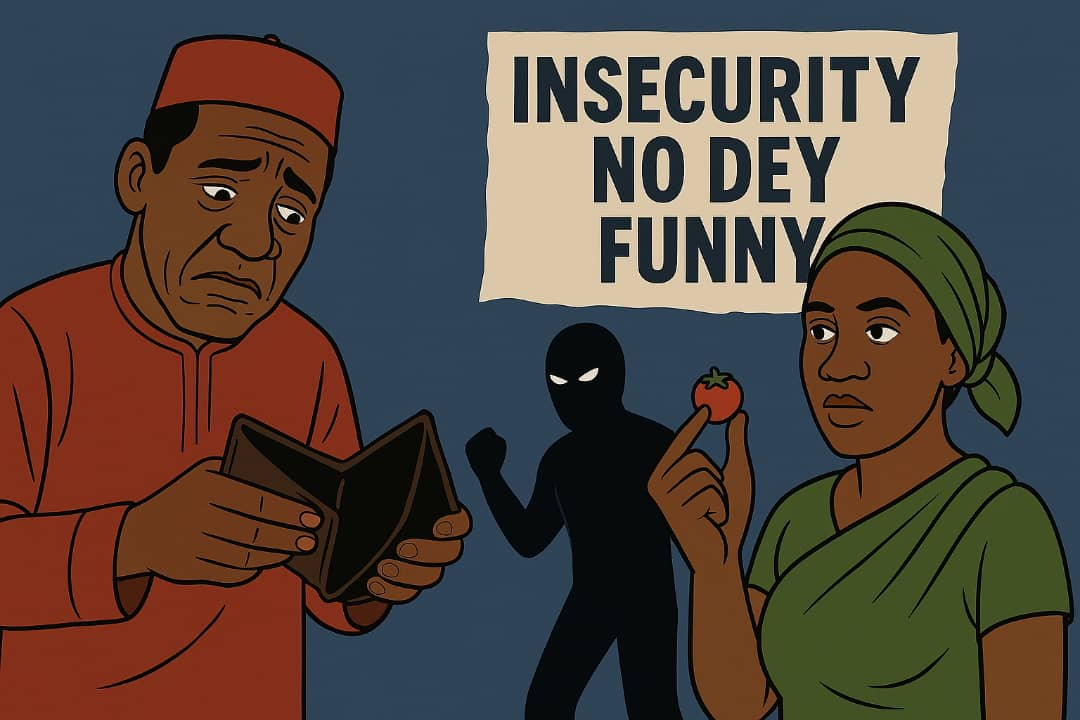Nigeria On The News
Why Nigeria’s Insecurity Problem Won’t End Without These Steps

Insecurity in Nigeria affects people in different places. People feel fear in villages, towns, and cities. Insecurity affects school children, market women, farmers, workers, drivers, and even those in offices. Insecurity makes it hard for people to move freely. It also affects food, transport, and trade. People who live in fear find it hard to plan for the future. Every year, more people complain about attacks, killings, and kidnappings. It is important to understand why this problem continues.
One reason for insecurity in Nigeria is poverty. Poverty makes people suffer. Many people do not have jobs or any stable income. Some people do not eat good food or go to school. When people do not have what they need to survive, they can turn to crime. A young man with no job and no hope may join a gang. Some people agree to work with armed groups because they want food, money, or protection. Poverty can push a person into doing dangerous things. In places where many people are poor, insecurity increases.
Another cause is weak law enforcement. Police officers do not always stop crime early. Some police stations lack tools, vehicles, and communication equipment. Some officers do not get proper training. A few even work with criminals. When people see that nothing happens to criminals, they lose trust. Some people do not report crimes because they feel nothing will be done. In many cases, criminals move freely without fear. This makes others feel unsafe. Weak enforcement gives room for insecurity to grow.
Ethnic and religious problems also cause insecurity. Some groups fight because of land, power, or past problems. Some communities do not trust others. If one group attacks another, it can lead to long violence. In some areas, people are killed because of their tribe or religion. This makes the country divided. People carry weapons to defend themselves, and this creates more fear. If leaders do not settle these differences, the fighting can continue.
Political problems also increase insecurity. Some leaders use violence to win elections. Thugs are used to scare voters or attack opponents. After elections, these thugs are abandoned. Some of them use the weapons given to them to start armed groups. These groups grow stronger with time. Some even begin to kidnap or rob. In places where political leaders fail to give justice, people feel angry. If people lose trust in politics, they may look for other ways to defend themselves. Political violence leads to deeper insecurity.
Another reason is bad borders. Some borders in Nigeria are not secure. People move in and out without proper checks. Criminals bring weapons through these borders. Some of them even come from other countries. When arms enter the country easily, crimes increase. If there are no strict controls, bad people will keep using these routes. Some towns near the borders suffer from constant attacks.
Kidnapping is also a part of insecurity. Kidnappers target school children, business people, travelers, and even farmers. They ask for money before releasing their victims. Many families suffer because of this. Some people have stopped sending their children to school because of fear. Farmers have stopped going to their farms. The roads have become dangerous. This has made food more costly because fewer people farm. It also affects movement of goods.
Banditry and terrorism are other causes. Some groups attack villages, kill people, burn houses, and steal livestock. Some of them do not allow people to sleep at night. These groups operate in forests and remote areas. They have weapons and sometimes move in large numbers. They block roads and demand money. They sometimes attack schools and take students. These groups make people leave their homes and run to safer places.
Bad roads and poor lighting make it easy for criminals to operate. If roads are broken and there are no lights at night, criminals take advantage. Vehicles break down, and people are stranded. Armed robbers take this chance to attack. If streetlights are not working, it becomes easy to hide in dark places. Safe roads and good lighting help to reduce crime.
Another issue is lack of data. Some security agencies do not have correct information. They do not know the full details of some communities. If they do not have names, pictures, and records, it is hard to stop crime. Without proper data, it is hard to follow criminals. Some criminals move from one place to another without being noticed. If security officers cannot track them, insecurity continues.
Drug abuse also contributes. Some people use hard drugs and lose control. They can become violent. Some youths who use drugs may join criminal gangs. Drug sellers also fight over areas where they sell. This leads to shootings in some streets. Drug problems affect many families. It also weakens young people and makes them lose their future.
Bad governance also leads to insecurity. If leaders do not provide good education, healthcare, and roads, people suffer. If people cannot find justice in courts, they may take laws into their own hands. If there is corruption in security agencies, crimes increase. People feel anger when they see leaders stealing money meant for development. When government fails in duties, insecurity rises.
To solve insecurity, there must be job creation. People need skills and training to find work. When people have something to do, they are less likely to join bad groups. Governments, private businesses, and churches can work together to train youths. Small businesses can be supported to grow. This helps the economy and reduces poverty.
Security agencies should be trained better. They need tools, vehicles, and communication equipment. Officers must be trained in modern ways to fight crime. Those who do wrong in the system should be removed. There must be good leadership in the police, army, and civil defence. Citizens must also be able to report crime freely without fear.
People must also be involved in security. Communities should form watch groups. These groups must work with police and not operate alone. Neighbours should share information when they see strange movements. Security is stronger when people work together. Traditional rulers and religious leaders should help to preach peace.
Government should invest in good roads and lights. If roads are smooth, people can move easily. Streetlights should work. Areas that are dark should be fixed. This makes criminals afraid to operate. Local councils and state governments should make this a priority.
Borders must be checked. Immigration officers should be trained and well equipped. Movement in and out of the country should be properly monitored. Smuggling of weapons must be stopped. If bad elements are prevented from entering, the country will be safer.
Education must be given to more children. A child in school learns right from wrong. Schools must be safe. Government must protect students and teachers. When education is good, crime reduces. Skills training should be part of school learning.
Drugs must be controlled. Agencies like NDLEA must be active. Drug sellers must be arrested. Awareness should be done in schools and communities. If youths know the danger of drugs, they will avoid it. Drug centres should help those who are already addicted.
Courts must give quick judgement. If people see that justice is done, they will not take laws into their hands. Corruption must be punished. Leaders must do what they say. If leaders are honest, people will follow. When people trust the system, peace grows.
Peace talks must happen in places with ethnic or religious tension. Leaders from different sides should meet often. Old grudges should be addressed. Land disputes should be settled in peace. No community should feel left out. Inclusion helps reduce anger.
Technology should be used in security. Cameras should be placed in major roads. Drones can monitor forests. Phones can be used to send emergency alerts. Security agencies should use data and computers to track criminals. This helps quick response and planning.
Community development helps to stop insecurity. Water, clinics, roads, and markets bring growth. When people see development, they have hope. They also begin to protect their community better. Security and development must go together.
Youths must be part of the solution. Youth leaders must teach others to avoid violence. Music, sports, and arts can keep them busy. Role models must be raised to guide them. Positive youth engagement reduces crime.
Solving insecurity takes time, money, and unity. It is not the work of only one group. It needs family, community, leaders, and government to act. The right steps must continue until the change is clear. When security improves, life becomes better for everyone.


 Digital Hustle6 months ago
Digital Hustle6 months agoHow to Make Real Money Online Using Simple Ways

 Money Moves6 months ago
Money Moves6 months agoHow to Avoid Bank Account Problems

 Stay Human5 months ago
Stay Human5 months agoHow to Know If You Are Losing Your Human Side

 Money Moves6 months ago
Money Moves6 months agoSimple Ways to Make Money the Honest Way

 Money Moves6 months ago
Money Moves6 months agoWays Small Business Loan Can Grow Your Work

 Local Genius Spotlight6 months ago
Local Genius Spotlight6 months agoSimple Steps That Made Ian Williams a Leader

 Money Moves6 months ago
Money Moves6 months agoHow to Make Money Without Stress

 Local Genius Spotlight6 months ago
Local Genius Spotlight6 months agoWays Small Entrepreneurs Grow from Nothing
































